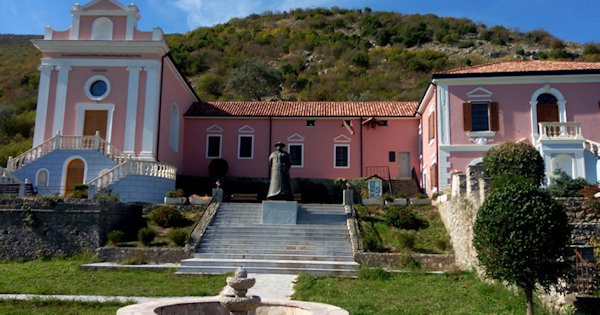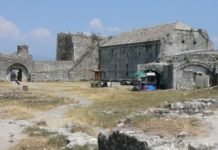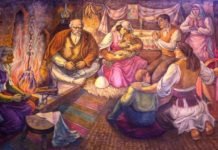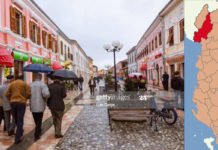Read also:
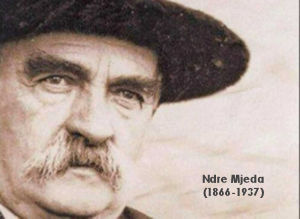
- Ernest Koliqi
- Filip Shiroka
- Gjergj Fishta
- Lazer Shantoja
- Martin Camaj
- Migjeni (poetry)
- Migjeni (prose)
- Ndre Mjeda
- Pashko Vasa
BIOGRAPHY
Classical poet Ndre Mjeda (1866-1937) bridges the gap between late nineteenth-century Rilindja culture and the dynamic literary creativity of the independence period. Mjeda was born on 20 November 1866 in Shkodra and, like so many other Gheg writers of the period, was educated by the Jesuits . Influential in his upbringing were Jesuit writer Anton Xanoni (1863-1915) and Franciscan poet Leonardo De Martino (1830-1923). The Society of Jesus sent the young Mjeda abroad for studies and training. He spent an initial three months in the spring of 1880 in the village of Cossé-le-Vivien near Laval in the west of France and thereafter attended a college at the Carthusian monastery of Porta Coeli north of Valencia, Spain, where he studied literature. In 1883, we find him in Croatia studying rhetoric, Latin and Italian at a Jesuit institution in Kraljevica on the Dalmatian coast. From 1884 to the beginning of 1887, he trained at a college run there which was run by the Gregorian University of Rome, and in 1887 transferred to another Gregorian college in Chieri southeast of Turin where he remained until the end of that year.
It was during these years that Ndre Mjeda began writing verse in Albanian, including the melancholic and much-read poem Vaji i bylbylit (The nightingale’s lament), published in 1887 in the booklet Scahiri Elierz (The honorable poet), expressing his longing for his native Albania. Also of this period is the poem Vorri i Skanderbegut (Scanderbeg ’s grave). The theme of the exiled Albanian yearning nostalgically for his homeland under the Turkish yoke was nothing unusual in Rilindja literature, in particular in the decade following the defeat of the League of Prizren, and many of his other poems are devoted to such nationalist themes. In Mjeda’s verse, however, we sense the influence not only of the Rilindja culture of the age, but also that of his mentor Leonardo De Martino , the Scutarine Catholic poet whose refined 442-page bilingual verse collection L’Arpa di un italo-albanese (The harp of an Italo-Albanian) had appeared in Venice in 1881. An equally important component in Mjeda’s verse were the contemporary poets of Italy: the patriotic Giosuè Carducci (1835-1907), the pensive Giovanni Pascoli (1855-1912) and the sensuous Gabriele D’Annunzio (1863-1938), as well as the Latin literature of classical antiquity.
From 1887 to 1891, Mjeda taught music at the College of Marco Girolamo Vida in Cremona on the River Po, the city of composer Claudio Monteverdi and of Antonio Stradivari . There and in Soresina he continued writing verse and at the same time devoted himself to the translation of religious literature. In 1888, the Propaganda Fide in Rome published his Jeta e sceitit sc’ Gnon Berchmans (The life of St John Berchmans ) about a Jesuit saint from Brabant, and in 1892 T’ perghjamit e Zojs Bekume (Imitation of the Holy Virgin) translated from Spanish. In later years he was to publish a translation of the Katekizmi i madh (The great catechism) in three volumes, Historia e shejtë (Sacred history), and a life of St Aloysius of Gonzaga.
From 1891, Mjeda studied for a couple of years at the theological faculty of a Gregorian college in Kraków in Catholic Poland. In 1893, we find the poet in Gorizia on the Italian-Slovene border and in the following year back in Kraljevica where he taught philosophy and philology and served as librarian at the Gregorian college. He was subsequently appointed professor of logic and metaphysics. It was in 1898 that a conflict is said to have broken out among the Jesuits of Kraljevica, apparently concerning their loyalties to Austria-Hungary and the Vatican. The exact details of the scandal are not known, but Ndre Mjeda was somehow involved and was promptly expelled or resigned that year from the Jesuit Order. Mjeda was a member of the Literary Commission set up in Shkodra on 1 September 1916 under the Austro-Hungarian administration, and from 1920 to 1924 he served as a deputy in the National Assembly. After the defeat of Fan Noli ’s June Revolution and the definitive rise of the Zogu dictatorship at the end of 1924 he withdrew from politics and served thereafter as a parish priest in Kukël, a village between Shkodra and Shëngjin. From 1930, he taught Albanian language and literature at the Jesuit college in Shkodra, where he died on 1 August 1937.
Mjeda’s poetry, in particular his collection Juvenilia, Vienna 1917 (Juvenilia), is noted for its classical style and for its purity of language. It is probably no coincidence that the title of this work for which Mjeda is best remembered is the same as Giosuè Carducci ’s lyric volume Iuvenilia which was published almost half a century earlier. Mjeda’s Juvenilia includes not only original poetry but also adaptations of foreign verse by Tommaso Grossi (1790-1853), Giuseppe Capparozzo (1802-1848), Charles Wolfe (1791-1823) and Johann Wolfgang von Goethe (1749-1832). A second cycle of poetry begun by Mjeda was to be devoted to the ancient cities of Illyria: Lissus (Lezha), Scodra ( Shkodra), Dyrrachium (Durrës) and Apollonia (Pojan). However, only the first two parts of this cycle ever saw the light of day. Lissus, composed of twelve sonnets, appeared in May 1921 in the Franciscan monthly Hylli i Dritës (The day-star), and Scodra was published posthumously in 1939.
Though not covering an especially wide range of themes, Mjeda’s poetry evinces a particularly refined language under the influence of the nineteenth-century Italian classics and, in general, a high level of metric finesse.
To the Albanian eagle
High amongst the clouds, above the cliffs
Sparkling in perennial snow,
Like lightning, like an arrow,
Soars on sibilant wings
‘Midst the peaks and jagged rocks
The eagle in the first rays of dawn.The azure sky above its head,
Companion of the stars, glows
Like jewels, like the shimmering
Gold of a bridal gown,
Or the radiant night in which
A god bestows wisdom and grace.Your kingdom is silent,
Eagle, arbiter of freedom,
And in the empty wastes
The harmony of stars
And the rising moon give you comfort,
And the pensive Muse is heard.But above the forlorn flatland
Where your children in lamentation lie,
Thunder resounds,
Lightning flashes,
And you above those peaks
Hear no echo of their lament.Oh, descend to us, royal
Eagle, once more, as you did
When in battle, majestic
Castrioti the Great shone forth
And the whole world trembled
At the brandishing of his sword.
[Shqypes arbnore, 1931, translated from the Albanian by Robert Elsie and first published in History of Albanian literature, New York 1995, vol. 1, p. 356-357]

